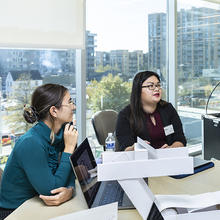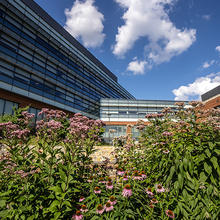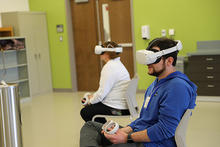- March 4, 2024
George Mason and AWS are working together on a new renewable energy lab and launching a concentration in Sustainable Data Center Engineering.
- February 29, 2024
The College of Engineering and Computing at George Mason University introduces four innovative graduate certificate programs in fall 2024, catering to burgeoning fields of mechanical engineering, computer science, systems engineering and operations research, and electrical and computer engineering. Professors leading each program provide insights into the curricula design, societal impact, and ideal candidates.
- February 26, 2024
Mason bioengineering majors hope that their capstone project will help individuals with prosthetic limbs live more comfortable lives.
- February 19, 2024
Bioengineering undergraduates demonstrate how a virtual reality-based physical rehabilitation system can improve patient outcomes.
- February 14, 2024
Mason Competitive Cyber continues a winning tradition with a series of wins at CyberForge conference.
- February 12, 2024
The Commonwealth Cyber Initiative Northern Virginia Node (CCI NoVa Node) is preparing for the third iteration of its Cybersecurity Traineeship Program, which offers a seven-week course to Virginia residents interested in pivoting into the cybersecurity sector followed by career support from George Mason University and Northern Virginia Community College professionals.
- February 12, 2024
While useful technology, drones can pose a serious security risk. Systems engineering and operations research undergraduates Dyar Aziz and Markus Garretson are working to develop a methodology for inferring drone intent based on sensor data.
- February 9, 2024
Funding from the Virginia Department of Education (VDOE) will create the School Nurse Leadership Academy, a first-of –its-kind program dedicated to fostering leadership in school nursing.
- February 5, 2024
Fuse at Mason Square will give student researchers like Soelem Aafnan Bhuiyan a dedicated space for globally impactful research.
- January 24, 2024
28 Master of Social Work students work with a substance-engaged adolescent in a Virtual Reality simulation. The majority of students felt more prepared to respond to changes in their client’s condition after participating in the simulation










